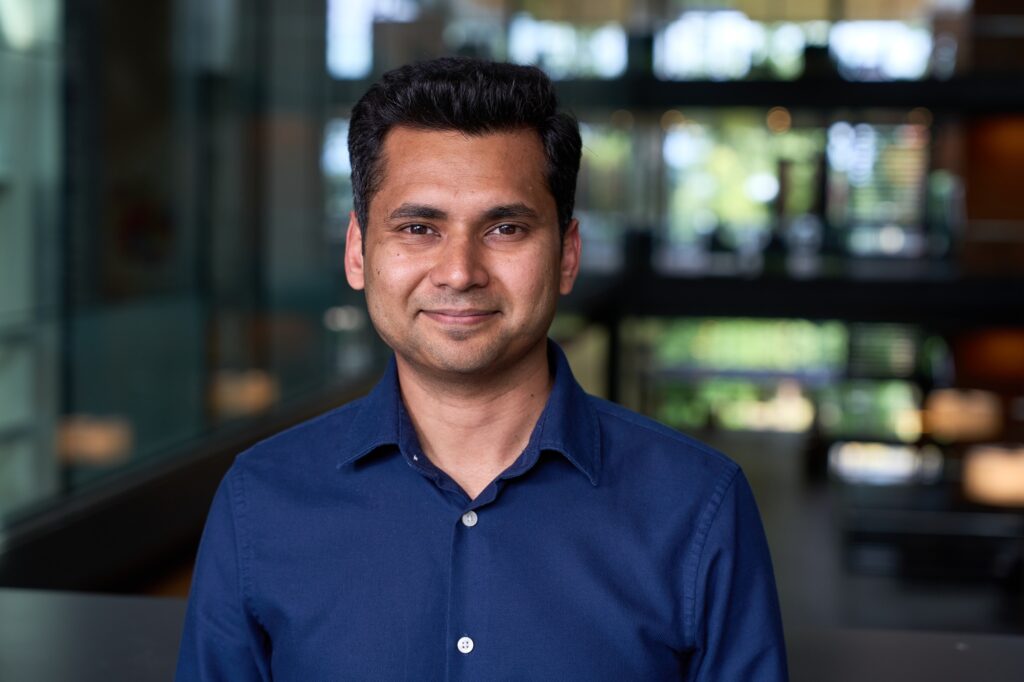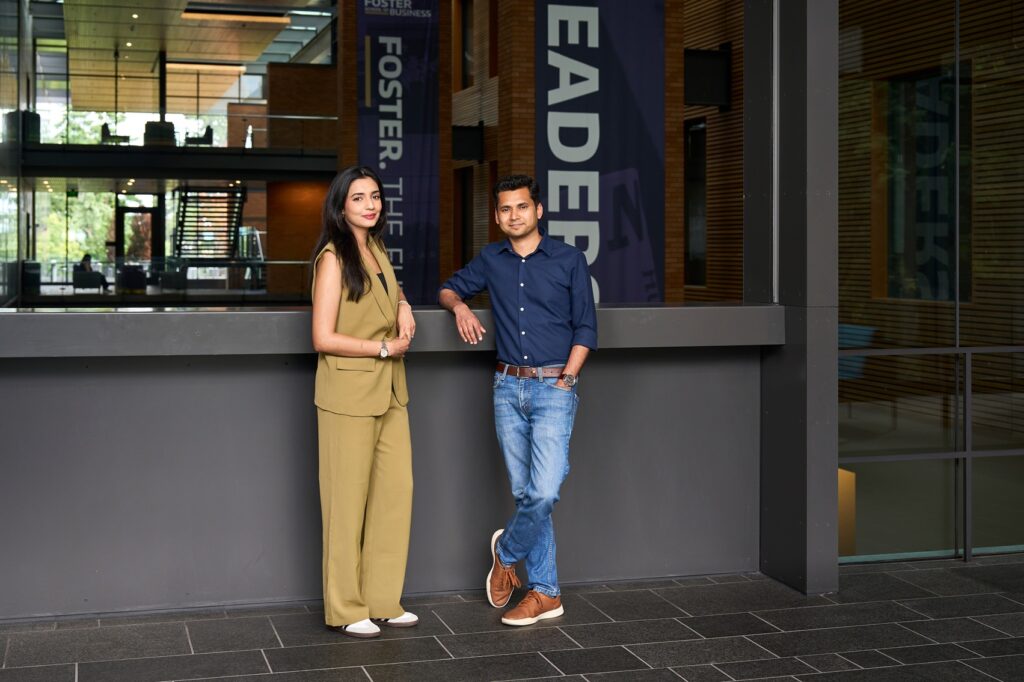Foster’s Mentorship Culture Turns Connections into Careers
In conversation with Rabiya Shahid (MSIS 2025) and Sreeram Nambiar (Principal Solution Engineer, Salesforce)
When Rabiya Shahid (MS 2025) enrolled in the Master of Science in Information Systems (MSIS) program at the Foster School of Business, she brought a business background, a big leap of faith, and a clear goal: break into solutions engineering.
She didn’t expect that a single company visit would introduce her to a mentor who would guide, coach, and cheer her all the way to her dream job at Salesforce.
In this Q&A, Rabiya Shahid and her mentor, Sreeram Nambiar, a Principal Solution Engineer at Salesforce, reflect on their connection, the power of organic mentorship, and why the Foster MSIS program and the city of Seattle can open doors in ways students can only imagine.
Let’s start with how the two of you connected. What brought you together?
Sreeram: Just before the pandemic hit in 2020, I moved to Seattle for my role at Salesforce. A colleague who is a Foster alum introduced me to a professor, and I ended up giving a guest lecture. That’s how I got introduced to the Foster community.
Later, I learned about the MSIS program and saw on the website that they were looking for industry mentors. I completed an MSIS degree at UT Dallas and felt at home with that model, so I enthusiastically signed up.
Fast-forward a bit, and Tal Lev [Assistant Dean, Specialty Master’s Programs] from the Foster team invited me to host a group of students at Salesforce. We had 20 to 25 students visit, and that’s how I met Rabiya.
Rabiya: That visit was such a pivotal moment for me. I had just moved to Seattle from Canada and was figuring out my next steps. I pursued Foster’s master’s in information systems because it perfectly blended technical and business skills, and offered opportunities to connect with the local industry.
When I heard about the Salesforce tour, I jumped at the chance. Funny thing: I was the only student who knew what solutions engineering is during that visit.
I’ve always been drawn to roles that blend technology, storytelling, and real-world problem solving, which is exactly what solution engineering does. That’s been my dream job for years. So I started asking Sreeram a ton of questions, and he was incredibly open and generous. I connected with him on LinkedIn that same day.

Was your mentoring relationship part of a formal program?
Rabiya: It was 100% organic. I wasn’t assigned to him; he just offered to connect with anyone who visited that day, which is rare for a leader at his level. Some people hesitate to give out their info, but he welcomed us. After that, we started chatting over LinkedIn, then email, then video calls, and eventually text. It just evolved naturally.
Sreeram: That’s right. Rabiya wasn’t my official mentee that year; we just clicked during that visit. What impressed me was that she followed through. I’d share resources, and the next time we met, she’d show up with thoughtful questions and insights. She was serious, prepared, and hungry to learn.
Why did you choose the Foster MSIS program, Rabiya?
Rabiya: It had the right mix of business and tech. I didn’t want a purely technical degree; I wanted something strategic. The Foster School of Business name carries real weight in Seattle and across the country, and I knew the program prioritized industry engagement. You don’t just get a degree; you get access to companies, events, mentors… all of it.

Speaking of Seattle, why is this city a great place to study business?
Sreeram: Seattle is a tech powerhouse. You’ve got Salesforce, Microsoft, Amazon, Google, Tableau, and many others right here. Foster is deeply plugged into that world. The school makes it easy for students to connect through company visits, events, panels, and mentorship. And that access? It makes all the difference.
Rabiya: I moved here specifically for those connections. From day one, I was active on LinkedIn, attending free tech meetups, and setting up informational interviews. I just kept showing up. That’s the magic of being in Seattle: the industry is right outside your classroom door.
What did mentorship mean to you during your job hunt, Rabiya?
Rabiya: It meant everything. The job market has been brutal. I read it was the worst since the 2008 crash. I left my job in Canada to pursue this degree in Seattle. I had no Plan B.
Sreeram was always in my corner, cheering me on and giving honest feedback. He gave me great advice, too. One strategy that stuck was organizing your job search into A, B, and C companies. Start with the Cs to build muscle memory, then work your way up. That helped me stay grounded and confident.

What motivates you to mentor, Sreeram, especially since you’re not a Foster alum?
Sreeram: Great question. When I moved to the U.S. in 2017, I had difficulty breaking into solution engineering. It’s a well-kept secret in tech, an excellent career for people who love technology, business, and storytelling.
People mentored me along the way, so this is why I give back now. Honestly, Foster was on my list when I was applying to grad school, but I thought the requirements were too high. I never applied; it felt too ambitious. So now, being part of the Foster community as a mentor is a full-circle moment. I’ve been really impressed by how organized and intentional the school is with mentorship and industry access. Not every university does it like this.
Let’s talk about how you landed your job at Salesforce, Rabiya. When did you know it was within reach?
Rabiya: I’ve wanted to work at Salesforce for five years. It was always my top company. The person who first introduced me to solution engineering worked there, and that stuck with me.
A few months ago, Sreeram sent me a LinkedIn post about an open role. I reached out to the hiring manager directly. The interview process moved fast. I think I had an offer in under two weeks.
Sreeram: That’s right. And I was traveling when it all went down. She had the job before I even got back! What I loved is that she didn’t even run a mock interview with me. She didn’t need to. We’d been prepping for months, and when the moment came, she was ready.
Rabiya: That’s how you know you have a great mentor; they teach you so well that you don’t need to rely on them every step of the way. I was ready because he helped me build skills and confidence in advance.

What networking tips would you give students hoping to follow in your footsteps?
Rabiya: Be brave and reach out. I kept a spreadsheet of all the companies I applied to, people I messaged, and recruiters I followed up with. I reached out to 732 people on LinkedIn. I even had a “script doc” for different types of outreach: warm leads, cold leads, referrals, you name it. You have to be methodical and genuine. Don’t just ask for a job; ask to learn.
Sreeram: Show up to events. Talk to the speakers. Engage in panels. You never know who will recognize your potential. And follow up: that’s where most people fall short. Approach speakers and panelists after their sessions. Ask thoughtful questions and express your genuine interest; this makes you memorable. The right conversation with the right person can change your life. I mean, look at Rabiya. That’s precisely what happened.
Now that you’re working at Salesforce, what advice would you give to your past job-hunting self?
Rabiya: Don’t panic. Keep showing up. I had a job offer rescinded earlier in the year due to changes at a company, and it devastated me. But things got better. I showed up to events even when it was raining, even when it was a dark winter evening. That persistence paid off.
Also, don’t be afraid to reach out to people, even if it feels awkward. That’s how I made it here. I might not be at Salesforce today if I hadn’t messaged Sreeram after that tour.
What’s next for you both?
Rabiya: I want to give back. I was just telling Sreeram the other day that I’m ready to help others learn about solution engineering. I’m still new, but I have a story, and I want to share it.
Sreeram: That’s the full circle. That’s what it’s all about.
Why should someone choose the Foster MSIS program?
Rabiya: This program changed my life. It’s not just about lectures or textbooks. It’s about being in the room where things happen. If you’re willing to put the work in, Foster will open doors you didn’t even know existed.
Sreeram: The curriculum is strong, but the community sets it apart. Foster makes mentorship, networking, and real industry access a core part of the experience, and that’s rare. This is the place to be if you want to break into tech and build a meaningful career.
Learn more about the Master of Science in Information Systems here.
